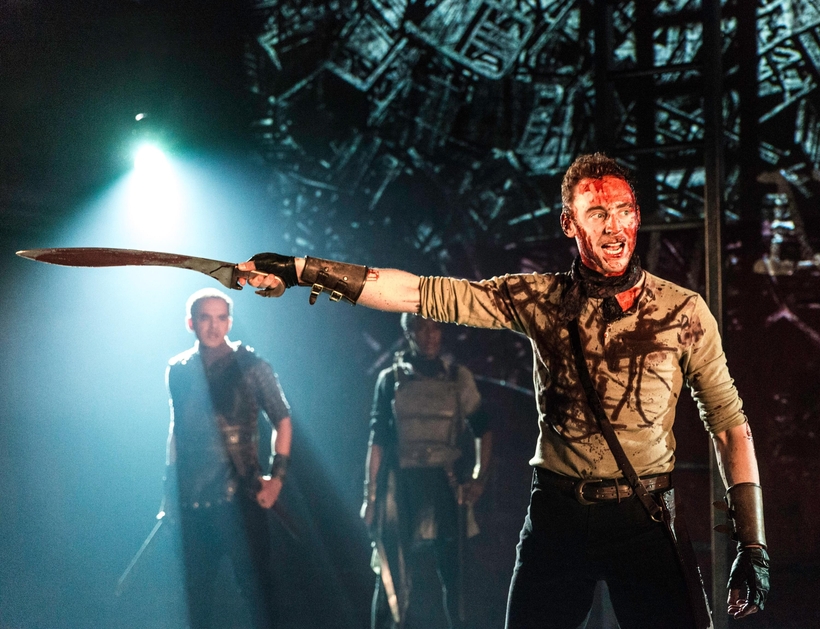Tom Hiddleston can keep secrets. With his ascetic mask, opaque gaze, and lanky frame, he might stand with the saints on the façade of Chartres Cathedral. In Marvel Studios’s popcorn cosmos, his ticket to fame and fortune was Loki, Norse god of trickery and chaos. For the caviar set, he starred as the C&W “Cheatin’ Heart” idol Hank Williams in I Saw the Light and manned ritzy front desks as the catlike intelligence operative Jonathan Pine in the John Le Carré miniseries The Night Manager. But for a God’s-eye view of Hiddleston’s skill set, check out his Coriolanus, broadcast live from London’s 250-seat Donmar Warehouse on January 30, 2014.
The turncoat Roman general Caius Martius—surnamed Coriolanus for his heroics while trapped alone in the enemy city Corioli—encompasses colossal contradictions. The ruling class adores him for his military triumphs. But he makes no secret of his disdain for the feckless common people, and they hate him right back, banishing him on pain of death. It’s at this point that Coriolanus—“a lonely dragon”—offers his sword to Rome’s enemies, with catastrophic consequences.
To contain the play’s epic sound and fury in a bear pit like the Donmar might seem a lost cause, yet Josie Rourke’s unobtrusive modern-dress production rises to the challenge, thanks in part to a hard-driving ensemble of stentorian yet pusillanimous citizens, cowed soldiers, and haughty servants. Likewise vital are the vain twinkles of levity scattered by Mark Gatiss as Menenius, the senate’s designated peacemaker, a diplomat not quite so cunning as he thinks.

Blazing at the center, Hiddleston takes possession of the space like an action hero, yet his inward moments are as supercharged as the athletics. His rhetoric ranges from lightning-edged torrents of words to brief, bleak verses of aching loneliness. Within the man-of-steel lives a singularly hard-headed boy of tears.
More than once, Rourke shows him bathed in blood, justifiably so. As Rome knows, and the enemy Volsces find out, Coriolanus is the puppet of his mother, Volumnia, an earthly Juno who keeps ghoulish count of his war wounds. Blood, she insists, “more becomes a man” than gilt becomes a trophy. Flinty yet politic, Deborah Findlay excels in the tremendous part. So, in purposeful contrast, does Birgitte Hjort Sørensen as Coriolanus’s mostly soft-spoken wife, Virgilia, his oasis in a pitiless world.
Coriolanus’s foil is the enemy general Tullus Aufidius—“a lion that I am proud to hunt,” as Coriolanus calls him early on. From the start, erotic sparks fly between the men, and there’s a brief honeymoon when Aufidius welcomes the exiled Roman more joyously, he says, than he welcomed his bride on their wedding night. “You bless me, gods!” is Coriolanus’s all but speechless reply.
For all his flaws, Coriolanus knows no guile. Aufidius, though, is a jealous soul, devious, grasping, hungry for rank. In the compact Hadley Fraser, who speaks with a laddish North Country burr, Aufidius seems, when we meet him, a diamond in the rough. As we will learn, the roughness is genuine, but he’s no diamond.
Tom Hiddleston’s Coriolanus is available for streaming on Internet Archive
Matthew Gurewitsch writes about opera and classical music for AIR MAIL. He lives in Hawaii

